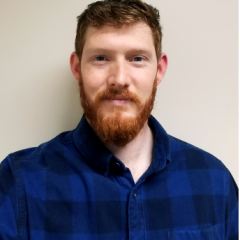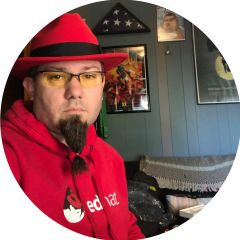Sysadmin careers: the correlation between mentors and success

Editor's Note: In this segment, the Sudoer Sit-Down, we pose questions to small groups of industry pros. You get real answers and opinions from real people—users, operators, admins, developers, etc.—each offering a varied and valuable perspective to questions surrounding the IT industry and system administration specifically.
The premise
Typically, the more information you have about a situation, the more successful you will be in navigating it. The same can be said about the level of experience you have in dealing with specific problems. This is what inspired me to explore the experience of other industry professionals. I had several great mentors over the years, and I always felt that the time spent learning from them paid off exponentially. It's not always some intellectual atom bomb that reshapes your skillset. Many times, the most powerful lessons are in the wisdom gained over time. Having the skill to act is great, but it helps to know when and how to act as well.
We asked a group of our core contributors about their mentors and the impact of these experiences on their careers. Some had specific people in mind; however, an equal number stated that a close-knit team can be just as valuable as a single guiding force.
The discussion
Joachim Haller (Senior Project Manager, Capgemini)
For the duration of my career, I have had one fantastic mentor, and, for a few years, when I had very challenging times, I had a second one. I will tell the story about both.
My first mentor emerged as I was working my principal year as a system administrator for Lotus Notes. I had learned how to manage the servers and databases through studies, but I was a novice when it came to networking, and I would often hear from the infrastructure engineers that the loss of connectivity was due to errors in Lotus Notes. I knew I had to learn about networking, or I would always end up with the short end of the stick in these discussions. So I went out and bought a 500-page book about TCP/IP and unknowingly started on the next leg of my journey as a sysadmin. My aim was not to become a network administrator. I really wanted to be able to have qualified discussions with the infra guys instead of being brushed off as an ignorant nuisance.
Things did indeed change. I found tools and methods to show exactly what was wrong, where it went wrong, and, in several cases, why it had gone wrong. I learned the shadowy world of firewalls and the trickery of intelligent routers that would play up as the networks grew and new countries were connected. Modems were replaced by the magic of the Internet, and new connectivity challenges emerged. Getting in contact with new sysadmins, I learned to be curious instead of a know-it-all.
By being curious, I could learn more, understand things better, and get a wider perspective of why certain things were done in different ways. Being curious also led me to ask exploratory questions; for instance, I would frequently challenge people to explain abbreviations they used in presentations, and often, they did not know, so we would look them up together. Allowing curiosity to guide me, I have qualified for new roles and responsibilities, and the dialogue with colleagues from other disciplines has become much more interesting. I am extremely grateful and hope that same curiosity will stay with me to the end of my days.
[ Check out the first article in this series: Need to know technologies for junior sysadmins ]
My second mentor did not actually know that I had selected him as my guiding beacon during what was a very challenging and confusing time for me. I had been sent to Asia to build up the corporate network and migrate whatever email systems and collaboration tools they had over to Lotus Notes. I was stationed in Bangkok with my family and had 16 countries to look after. Even though I had been working with some of them online, it was a completely different ballgame to be out there in the sticks, looking at a server in a shower cabinet and having to fix it. I was building up a data center as part of the global infrastructure, working in teams with local sysadmins. These were guys that were used to being king of the hill, and now I gently had to demote them to checking log files without any admin access to the servers. In addition to the hands-on technical work, I was also the IT manager for Asia, and while I am a pretty social person, I had much to learn about culture and management.
That's when I met Liam, the production plant manager in Singapore. He was a down-to-earth character who knew every nook and cranny of his enormous technical plant. He would walk to the local food court and get his lunch, as opposed to other managers that had their secretaries bring their lunch to the (managers-only) lunchroom. Liam talked to everyone and was adamant when it came to crew safety. He was a hardworking professional with high demands, and yet there was a very human side to everything he did. If there was a problem, he was there, on the ground, talking with people, helping out, discussing, reviewing. Everybody had the greatest respect for him, but they were not afraid to make their voice heard. The executive board would send him to production plants all over the world whenever things needed fixing or when they had bought a new plant—as had been the case in Singapore, where he had now been for a few years.
Then it happened—a fatal accident at a nearby plant. The board called him, and he was on site the next day. He cared for the relatives, prepared for the funeral, paid his respects, and in the most sincere way, claimed responsibility for what had happened, although he was not the manager when the horrible incident occurred. The next thing he did was to ask the safety officers to provide him with a complete list of everything on the plant that needed attention. The plant in question was relatively small and had never done particularly well in the market. Red numbers had resulted in savings that had eventually compromised staff safety. The list of things to fix was long, and he started methodically attending to each and every line item. At the same time, he went through the plant product portfolio and decided to discontinue some products in favor of others. He understood the market and knew what products were in demand and did not require long haul transports. Six months later, the plant showed a profit AND crew safety was top notch. Liam was respectful, determined, knowledgeable, and curious. It was not until he retired that I told him he had been my mentor. He smiled with me and said I had been a good student.
Damon Garn (Owner, Cogspinner Coaction, LLC)
I never really had a single mentor, per se, but I worked with a very solid group of technical trainers for over 20 years. Between us, we all had a vast amount of classroom delivery experience and real-world IT knowledge. We helped each other prepare for new courses, coached each other through new technologies, and exchanged ideas on successful classroom presentations (both in-person and online). It was a wonderful group, and we still get together periodically and laugh about old times (like the manager who went on and on about the benefits of IPv5).
Having such a knowledgeable team made it easier to take on new challenges. I was the first of us to begin working with Linux in the early 2000s, so I could use my knowledge to help the security trainers as they got rolling with various security tools, such as Kali Linux (called Backtrack at the time). Later, those same guys helped me better understand Cisco switch and router configuration. Relying on each other made a difficult job easier and more pleasant. I can't say that I miss those days, but I'm glad I got to experience them with such great people.
Nate Lager (Technical Account Manager, Red Hat)
In my first role as an actual admin (junior network administrator, though the actual job was a lot more systems than network), the senior admin that was there when I was hired was a very patient and helpful guy. I'd love to track him down today and ask him what he really thought of me when I was such a green admin. He never seemed to get impatient or frustrated with my skills (or lack thereof), even when it came to Windows servers, which I had very little experience with. He and I worked together for about six to eight months, and then he left for greener pastures. The work environment there was otherwise pretty poor, so I can't blame him. I learned a great deal from him that you just can't learn in school—how to be a good admin, how to minimize change, how to work with clients, not to mention technical skills. My first real introduction to programming came in large part from him. My experience with him really gave me something to reflect on later in my career when I was no longer the novice and was doling out advice to new sysadmins.
There was a second experience with mentors that really sticks with me, but it wasn't just one person. When I finally left that first job, I moved into higher ed, a small liberal arts college. The team already consisted of a number of very skilled network and systems folks. I already knew a few of them, as we'd all worked together at a local internet service provider, and that's part of how I found out about the job. I came in with a wealth of my own knowledge and experience, and within a few years, I learned so much more from these IT rock stars. Again, there was never a case where I felt like I couldn't ask a dumb question, and even my mistakes were handled with grace. I've always seen the value in sharing my experience with others, but my experiences this early in my career really helped turn me into the person I am today.
Joerg Kastning (System Administrator, Bielefeld University)
I started my career with three years of professional training. During this time, I learned from experienced colleagues all I needed for my future jobs, including networking, systems administration, and simple project management. My trainers/colleagues were patient and supportive, and it was a very friendly atmosphere in which to grow my IT knowledge. Because I was a trainee, my failures were tolerated, unless, of course, I repeated them. We had a lot of different customers from various industries back then, which gave me a great opportunity to broaden my knowledge and eventually become a sysadmin.
[ You might also like: What's the source of sluggish career advancement for Linux system administrators? ]
Some years later, after I got my bachelor's degree and started working for another company, I met a guy I like to call my favorite developer and who has since become a good friend. He was (and still is) a developer, and I was a sysadmin. We shared our experience with each other, learned from each other, and eventually became DevOps, which was the new tech buzzword back then. There was another young guy who started as a developer at the same time and who also became a great sysadmin over time. Today we three work for different companies in different countries, but we've managed to stay in touch. And when we meet up for some kind of tech talk, we still learn from each other. My hope is that it will put a little smile on their face when they read this.
Anthony Critelli (Sr. Systems Engineer, Datto Inc.)
I've always struggled to come up with a good mentorship story when this topic comes up. I'm fortunate to have worked with some great people during my career, but I've not had a single person who I relied on as a mentor. The more I thought about this, though, the more I realize that it's OK; the combined lessons taught to me by many different people are just as valuable as those that can be learned from a single person. With that in mind, I'll share one of my favorite anecdotes.
I was just about to come off a night shift during an internship in IT operations when we had a sudden outage of a critical system. It seemed that some hardware had failed in an odd way that didn't trigger a failover. The morning shift (including the engineering staff) was arriving, so we all walked over to the data center to inspect the questionable hardware. As we stood around computer parts splayed out on a cart, a senior manager walked into the data center to take a look. I smiled nervously at him and said, "Having fun yet?" He laughed and said, "Anthony, we work in retail. We need to get this fixed, but nobody is dying because this system is down. It'll be just fine."
I've always remembered that as one of my most valuable IT lessons because it contrasts so starkly with how IT organizations usually run. Very, very few industries operate an IT infrastructure that must truly be highly available, yet we throw around the phrase mission critical as if it applies to everything. Outages require that we convene war rooms and work all weekend to figure out what's going on. Whenever I'm dealing with an issue and someone begins to get overly nervous, I just remember the calm realism of that senior manager from years ago.
[ Want to test your sysadmin skills? Take a skills assessment today. ]
Wrap-up
If you've read this far, you will have noticed several themes emerge from the accounts above, even though each contributor has a journey unique to themselves. If I had to summarize the insight these professionals have shared, it would be this:
Be a sponge. If you work with experienced professionals, they have tangible skills to teach, but more than that, they have insight for you to learn from. Try not to ask the same questions repeatedly. A safe space to ask junior questions is a must for early career growth. You don't have to formally discuss mentorship; you can just observe and show interest in learning, and the outcome will effectively be the same. Finally, in stressful situations, keep your cool and fall back on the skills you know. Most often, the critical issues are best handled with swift, accurate application of the proper fix.




Tyler Carrigan
Tyler is the Sr. Community Manager at Enable Sysadmin, a submarine veteran, and an all-round tech enthusiast! He was first introduced to Red Hat in 2012 by way of a Red Hat Enterprise Linux-based combat system inside the USS Georgia Missile Control Center. More about me







